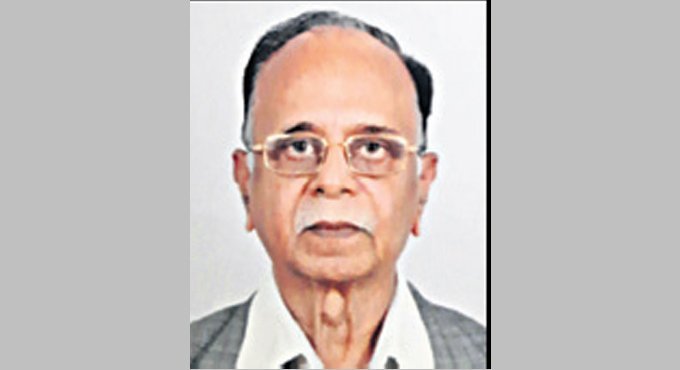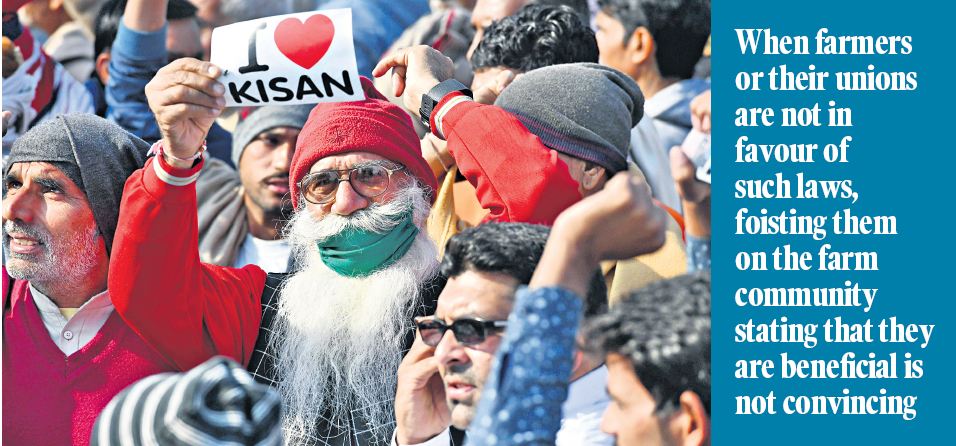Farmers deserve a better deal
Government should shed its rigidity and find a middle ground accommodating farmers’ aspirations

The farmers’ protest, being spearheaded mainly by farmers of Punjab and Haryana, around New Delhi braving Covid-19 and cold wave conditions, against the three farm laws, has engaged the attention of not just the nation, but also found an echo in Canada, where the Prime Minister of that country cautioned the Indian government against excesses in dealing with peaceful protests.
Talks between farmer unions and the government are on to find an amicable solution. Farmers want repeal of the laws while the government is against it. A middle ground needs to be found that is focused on the minimum support price (MSP) being made a legal requirement. The government’s viewpoint is that such legal requirement for MSP has no precedent and that it is a subject of subordinate legislation and, at best, it can give a guarantee for MSP in writing separately.
Opaque System
In the first place, it is necessary that all important legislations have involvement of civil society. In this case, farmer unions, federations ought to have been involved in the meetings and debates on the Bills in question. Even if the laws are passed contrary to the view of unions, their views can be recorded in the minutes of meetings and debates to lend a purpose of transparency and honesty in legislation. That, in essence, is the democratic functioning of Parliament/government.
Now there is mudslinging by the government that the agitation is inspired and abetted by external forces such as Khalistanis or the internal banned groups like Maoists. There was a veiled warning by Capt Amarinder Singh, Punjab Chief Minister, that the farm laws and the ongoing agitation against them are a national security threat. When the farmers or their unions are not in favour of such laws, foisting them on the farm community saying that they are beneficial is not convincing. There needs to be a demand or agitation in favour of such laws and not against them.
State Subject
Under the constitutional scheme, agriculture is also a central subject figuring in the “Concurrent List”. It needs to be noted that every amendment to the Constitution, when the ruling party possesses brute majority in Parliament, results in addition of subjects to the Concurrent List. But common sense and federal principle suggest that it is basically a State subject.
According to the constitutional scheme, as interpreted by the Supreme Court, federalism is a basic feature of the Constitution. It should not be tampered with in larger national interests of unity and integrity. The legislative power of State’s Assemblies can neither be abridged nor usurped by Parliament. Such and similar actions will strengthen the growing apprehension that the laws are made for the greater good of corporates.
Over the years, through amendments to the Constitution, Parliament encroached into the domain of State legislatures. The State laws need to pass two tests now. One is that law needs to pass the test of Article 13. The laws which are inconsistent or in derogation of fundamental rights will be struck down by the Supreme Court.
The second is that laws passed by the State legislatures need to conform to the laws made by Parliament. If they are inconsistent or repugnant, they will not be approved by the Central government (Article 254). Therefore, several State laws intended to battle “organised crime” more effectively are not getting approval of the Union government due to Article 254. The battle against crime or corruption this is only half won due to the parliamentary dictatorship. Article 254 is anti-federal and needs to be struck down by the Supreme Court.

Right Answer
MSP need not necessarily involve entire procurement of farm produce, keeping in view the transportation, storage losses, misappropriation, etc. Procurement to the extent of the public distribution system is enough and for the rest, the differential amount between the MSP and the prevailing lower market price can be reimbursed by the government through cash transfers. If the market price is equal or higher than MSP, such an obligation does not arise.
For fixation of cost of production, field experiments and not enquiries is the answer. There is no denying the fact that farmers need to have substantial profits over and above the cost of production. Suppose the cost of production of a crop per hectare is Rs 20,000, the farmer needs a profit of a minimum of Rs 15,000 in addition to the cost of production, and the MSP needs to be related/linked to the cost of production and margin of profit to the farmer so that he can meet his daily needs.
Field experiments to evaluate the cost of production can involve leasing two or more hectares of land in a particular area by the agricultural department of the government and raising crops. In such a case, the reality of the cost of production can be arrived at.
Grant MSP
Overall, democracy according to the elderly politician of India and former Punjab Chief Minister, Parkash Singh Badal, is conciliation and consensus. Therefore, it is for the government to shed rigidity in its stand and accommodate the aspirations of farmers to the best possible extent.
Constitutional provisions (Articles) or the amendments that result in the accretion of subjects to the “Concurrent List” need to conform to the “basic features” such as Secularism, Federalism and Democratic spirit and not override them.
The farming community, buffeted by vagaries of nature, needs help. Farmers deserve a better deal. MSP needs to cover not just cereals but also pulses, groundnut, chillies, cotton, sugarcane, turmeric etc.
(The author is a retired IGP)
Now you can get handpicked stories from Telangana Today on Telegram everyday. Click the link to subscribe.
Click to follow Telangana Today Facebook page and Twitter .
Related News
-
LV Prasad Eye Institute inaugurates exclusive glaucoma institute in Hyderabad
-
Why Hyderabad’s pedestrians shun subways despite safety benefits
-
Hyderabad: Residents oppose Gandhi Sarovar Project over ‘forcible’ land acquisition
-
Telangana High Court allows State, Centre three weeks to file counters on plea against GHMC split
-
Man booked for illegal teak timber storage in Chintapalli
21 mins ago -
Stop combing operations in Karregutta hillocks: CPI (ML) Mass Line
21 mins ago -
Bribery allegations surface against Minister Vivek over Kyathanpalli municipality power bid
21 mins ago -
Jagga Reddy urges Congress high command to recognise Jeevan Reddy’s loyalty
21 mins ago -
Don’t fear false cases, Jagan tells YSRCP cadres
1 hour ago -
UNICC to set up AI, quantum Centre of Excellence in Amaravati
1 hour ago -
Ruckus in AP Council over Tirupati laddu issue, House adjourned
1 hour ago -
Andhra Guv reviews International City Parade at Fleet Review 2026
1 hour ago




